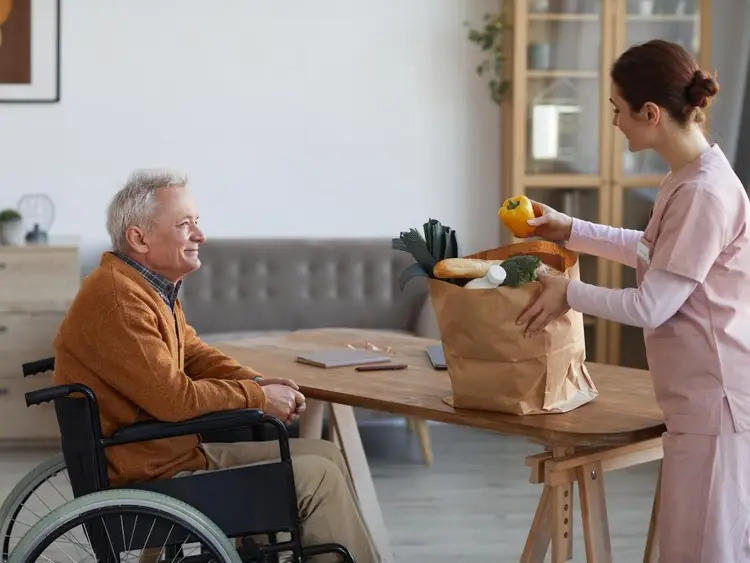Aging can bring many challenges, including loneliness, reduced mobility, and difficulty managing daily tasks. For many seniors, maintaining independence while receiving the care they need is a delicate balance. This is where elderly companion care plays a crucial role in enhancing senior well-being. Elderly companion support focuses on providing emotional support, social interaction, and assistance with daily activities. Unlike medical caregiving, companion care is designed to improve seniors’ quality of life by offering companionship, helping with light household chores, and ensuring they stay engaged in meaningful activities. Many families seek these services to provide their aging loved ones with the care and companionship they need without placing them in full-time assisted living facilities.
Companion caregivers help seniors with various non-medical tasks such as meal preparation, transportation, and social outings. More importantly, they offer emotional connection, reducing feelings of isolation and depression that are common among older adults. Studies show that regular social interaction can significantly improve seniors’ mental and emotional health, leading to a longer, happier life. This article explores the benefits of elderly companion support for senior well-being, including improved emotional health, increased independence, and enhanced safety. Whether seniors live alone or with family, companion care provides the additional support they need to thrive. By understanding these benefits, families can make informed decisions to ensure their elderly loved ones receive the companionship and care necessary for a fulfilling life.
Enhancing Senior Well-Being with Elderly Companion Care
1. Emotional and Mental Well-Being
One of the greatest benefits of elderly companion support is its impact on emotional and mental health. Many seniors experience feelings of loneliness and isolation, which can lead to depression and cognitive decline. Companion caregivers provide meaningful conversation, engagement in hobbies, and emotional support, helping seniors feel valued and connected.
Key Benefits:
- Reduces feelings of loneliness and social isolation
- Encourages participation in enjoyable activities
- Provides emotional support and companionship
- Helps prevent depression and anxiety
2. Encouraging Independence
Maintaining independence is a major concern for many seniors. Companion caregivers help them continue living at home while assisting with daily tasks. Unlike full-time nursing care, companion care allows seniors to remain in control of their lives while receiving the support they need.
Key Benefits:
- Assists with daily activities without taking over
- Encourages seniors to stay active and engaged
- Provides support while allowing independence
- Reduces reliance on family members for basic tasks
3. Assistance with Daily Activities
While elderly companion care does not include medical assistance, it helps with essential daily tasks such as meal preparation, housekeeping, and personal grooming. These services ensure seniors can maintain a clean and comfortable living environment.
Key Benefits:
- Helps with light housekeeping and organization
- Supports meal preparation and healthy eating habits
- Assists with grocery shopping and errands
- Encourages seniors to maintain personal hygiene
4. Increased Safety and Security
Seniors living alone may face safety concerns, such as falling or forgetting important tasks like taking medication. Companion caregivers offer an extra layer of security by monitoring seniors and ensuring they follow daily routines safely.
Key Benefits:
- Reduces the risk of falls and household accidents
- Provides medication reminders (if needed)
- Ensures a safe and clean living space
- Offers immediate assistance in case of emergencies
5. Social Engagement and Recreational Activities
Staying socially and mentally active is essential for a senior’s well-being. Companion caregivers encourage participation in social activities, hobbies, and recreational outings to keep seniors engaged and stimulated.
Key Benefits:
- Encourages socialization with friends and family
- Supports participation in hobbies and favorite activities
- Provides companionship during outings and events
- Helps prevent cognitive decline through mental engagement
6. Relief for Family Caregivers
Family members often struggle to balance caregiving responsibilities with work and personal life. Elderly companion care allows families to have peace of mind knowing their loved one is cared for, reducing stress and burnout among caregivers.
Key Benefits:
- Allows family members to take breaks without worry
- Reduces stress and burnout among caregivers
- Provides professional support for non-medical needs
- Enhances family relationships by reducing caregiving strain
7. Affordable Alternative to Full-Time Care
Compared to nursing homes or full-time in-home medical care, elderly companion support is a more affordable option. It provides essential support without the high costs associated with medical caregiving.
Key Benefits:
- More affordable than full-time nursing care
- Flexible care options based on individual needs
- Allows seniors to stay at home instead of moving to a facility
- Provides essential support without medical costs
Why Elderly Companion Care is Essential for Senior Well-Being
Elderly companion support plays a crucial role in enhancing seniors’ quality of life by providing emotional support, social interaction, and assistance with daily activities. It helps prevent loneliness, promotes mental stimulation, and ensures seniors remain active and engaged. This type of care also offers a cost-effective solution for families seeking non-medical support for their aging loved ones. By prioritizing companionship and well-being, elderly companion support allows seniors to maintain independence and enjoy a fulfilling, enriched life.
To sum up, elderly companion care plays a vital role in improving senior well-being by providing emotional support, social engagement, and assistance with daily activities. It helps seniors maintain independence, enhances safety, and reduces feelings of isolation. Whether through simple companionship, help with chores, or engaging in hobbies, companion caregivers make a meaningful impact on a senior’s quality of life. For families, companion care provides peace of mind, knowing their loved ones receive the support and attention they need without moving to an assisted living facility. It also offers an affordable alternative to full-time care, allowing seniors to remain in their familiar environment. By investing in elderly companion support, seniors can enjoy a more fulfilling, active, and independent life while staying socially and emotionally connected. Choosing the right companion care service ensures a happier and healthier aging experience for your loved ones.

